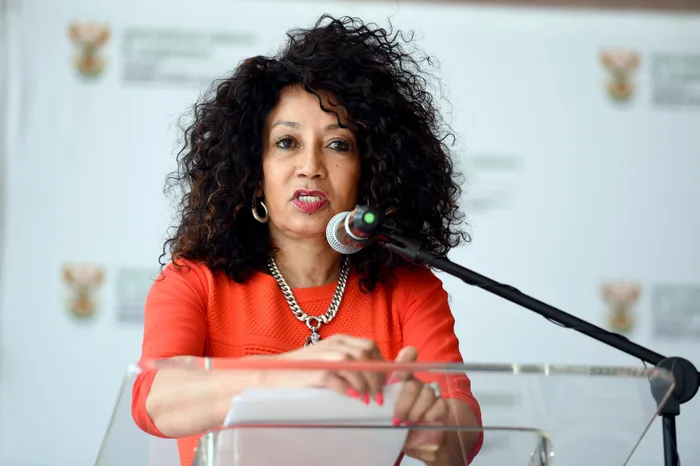Women in politics: Incredibly capable women lost in the cacophony of patriarchs

Human Settlements, Water and Sanitation Minister Lindiwe Sisulu. Photo:Yandisa Monakali/DNS
Professor Athambile Masola
The United States of America finally has their first woman as vice-president elect: Kamala Harris. Once again, the role of women in politics has come into the spotlight.
Recently, Minister Sisulu spoke at a Cosas lecture with the theme “Women in Politics”. Much of the speech paid homage to historical figures such as Queen Regent Lobatsibeni from Swaziland and highlighted Krotoa’s role between the Dutch and the indigenous people, as well as African women who were involved in the 1913 pass protest in Bloemfontein and women from the 1950s resistance period.
While it is fitting to locate the political role of women historically, the speech was largely silent about the legacy of women in politics within contemporary politics as well as the past 26 years of democracy.
It seems odd that someone who has been in politics for over three decades would be silent about contemporary examples, not only from South Africa but the continent as a whole. An overwhelming focus on the historical narrative begs the question: where are the women in current politics?
While listening to the minister’s speech, I was reminded of Julius Malema’s critique of the minister when she announced that she would be a candidate for the ANC presidency three years ago. In his response, he challenged: “What are Sis Lindiwe's ideas other than that she’s a child of Walter Sisulu? What does Sis Lindiwe stand for? She’s got her own Struggle credentials; they can be traced. There is no exclusive idea she represents.”
While this critique is typical of Malema’s engagement with the ANC, it also smacks of sexism within a broader, disparaging attitude towards the ANC.
What was implicit in Malema’s statement was the question of women in ANC leadership: the contradictions they sit with as members of a party with a complicated history with women, the sometimes absent-presence of women in post-1994 ANC, at times as a result of their own humility.
Minister Sisulu missed the opportunity to reflect on the challenges she and her peers have faced in the past 26 years in more pointed ways. The loss of Dr Dlamini Zuma in the ANC presidential race and the ANCWL’s bungled declaration: “We are not ready for a woman leader” are part of the narrative of women in politics with which the minister’s speech did not seem to engage.
Since 1994, Minister Sisulu has occupied many key ministerial positions – Human Settlements, Water and Sanitation, International Relations and Co-operation, Public Service and Administration, Home Affairs (Deputy Minister), Defence and Military Veterans, Intelligence – as well as key ANC positions. However, her presence has not captured the public imagination in the same way as her male counterparts who are often younger and less experienced than she is.
While her experience in government has been in a variety of positions, her time line suggests that the housing sector is where she has spent the most time (about 10 years), which is the area where her impact could be felt.
The Breaking New Ground Programme and N2 Gateway Housing Project come to mind, as does her statement in 2014 that people younger than 40 did not qualify for free housing. This was one of the moments where the minister became unpopular for shaming poor, young people. And there is her account of her role in the factions of the ANC which contributed to the many failures of the ANC. This was largely characterised by equivocation while campaigning for the presidency in 2017. And then there was: “I believe she believes she was raped,” when asked about Fezeka Ntsukela and the Jacob Zuma rape trial.
A cursory, desktop analysis of Minister Sisulu’s time in politics suggests that something is wanting: there’s a sense of recency given the 2017 presidential campaign, as though that was her major debut in politics. Either she has kept a low profile deliberately or she has deliberately been kept in the margins, or the positions she has occupied have not warranted much attention or there have been fewer scandals during her tenure.
One wonders, if Minister Sisulu were a man with the same trajectory she has had, if she would not have been president already. It is not surprising that her credentials have not laid a path for her towards the Presidency. Patriarchy is ruthless, even to the most well-connected and politically savvy woman, because it is a system designed to keep women in their place. Moreover, the complicity of women in power with patriarchy inadvertently leaves them embroiled in politics which do not take women seriously.
It would be interesting to take a look at the inner circles of all of the ministers and how many of them have surrounded themselves with women placed in strategic positions rather than administrative positions. One wonders about the conversations among ministers Pandor, Nkoana-Mashabane, Didiza, Dlamini Zuma and De Lille. Not to mention the longer list of former ministers who share the experience of being a woman in politics. The list is a litany of incredibly capable women who seem to get lost in the cacophony of the patriarchs.
Implicit in the narrative about women in politics is always the question of whether or not women are taken seriously. It is a pity that Minister Sisulu did not use her speech to honestly reflect about the chequered past of women in politics, particularly in the ruling party. The lived history of which Minister Sisulu has been a part is equally as important as the lives of Charlotte Maxeke and Lilian Ngoyi. It is not enough to hide behind the names of other stalwarts because this plays into Malema’s reading of not having an ideological position.
* Professor Masola, is with the Faculty of Humanities at the University of Pretoria.
** The views expressed here are not necessarily those of IOL.
Related Topics: